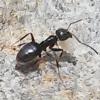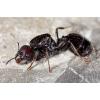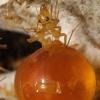@KBant, What I think he does is one of three things:
1. He pours sand around his mold, and makes it so that when he pulls the product off of the mold, it retains the sand. For example, in a clay mold, he would loosely imbed a thin layer of sand in the clay, and then when he pulls off the finished formicarium from the mold, it retains some of the loose sand.
2. He uses sand to mold the Chambers, and then when the material dries, he washes it out. This will leave a clean coat over the interior surface
3. He has a mold, which is skeletal, as it's protruding surfaces for the Chambers are much smaller than the chamber will actually be. Then, he coats them in a thick layer of wet sand, which holds its shape, at least somewhat, and then pours the material. Then, similar to method 2, he would pull the formicarium out of the mold and wash it off, leaving an even coat of sand on all surfaces of the cement, grout, or whatever he uses (I don't think very many people know the exact composition).
I could very well be wrong though.
As for the glue question, hot glue and aquarium safe silicone work well. Sometimes I use grout to seal cracks, but I would stick to silicone and hot glue. The thing about hot glue is it doesn't stick to grout and firebrick all the time. Sometimes it works, other times it pops right off. As other people have said, Elmer's glue works fine as well, just allow it to dry before using whatever you applied the glue to with ants.
![]()






















